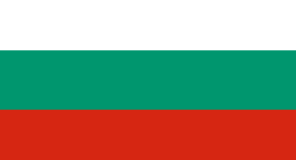Bulgaria
Green Hydrogen Vision
Bulgaria’s green hydrogen vision focuses on establishing the country as a leader in hydrogen technologies within Southeastern Europe, contributing to the EU's climate neutrality goals by 2050. The strategy prioritizes developing green hydrogen infrastructure, including electrolysis capacity and transport networks, to decarbonize industries like chemicals, glass, and refineries while advancing sustainable mobility. Bulgaria envisions hydrogen as a key enabler of its energy transition, integrating renewable hydrogen for energy storage, grid balancing, and export through the Southeast Hydrogen Corridor. By fostering innovation, regional cooperation, and leveraging EU funding, Bulgaria aims to align with European hydrogen goals while creating economic opportunities and enhancing energy security.
National Strategy
Bulgaria’s 2023 National Hydrogen Roadmap, overseen by the Ministry of Innovation and Growth, is designed to promote hydrogen technologies across the industry, energy, and transportation sectors. It aligns with broader European decarbonization objectives and outlines a plan for green hydrogen production, emphasizing the importance of regulatory support, financial backing, stakeholder engagement, and public involvement. This roadmap lays the foundation for advancing the hydrogen economy over the next decade, with planned activities from 2023 to 2026.
The National Hydrogen Roadmap aligns with both international and national strategies, including the UN Sustainable Development Goals, the European Green Deal, and the Paris Agreement. By adhering to the EU's climate neutrality goal by 2050, Bulgaria reinforces its commitment to reducing greenhouse gas emissions. The roadmap also supports national strategies such as the National Development Program Bulgaria 2030 and the Innovation Strategy for Smart Specialization 2021–2027.
Bulgaria’s roadmap introduces additional initiatives through the Hydrogen Accelerator to accelerate the adoption of hydrogen technology. These actions include doubling renewable hydrogen production targets, establishing hydrogen valleys, fostering international partnerships, developing hydrogen infrastructure, and revising renewable energy policies. The roadmap acknowledges the rising global competition in the sector, emphasising the need for Bulgaria to have a clear and ambitious plan for promoting hydrogen production.
Vision
- The Bulgarian National Hydrogen Roadmap aims to stimulate the growth of hydrogen technology, achieve climate targets, reduce emissions, promote renewable energy, and move toward a circular economy. It ensures a balanced transition to climate neutrality while considering Bulgaria’s unique economic factors.
Strategic Objectives
- The roadmap defines strategic objectives, including the decarbonization of the economy, the transition from traditional energy sources to hydrogen, and building the capacity to harness hydrogen technologies.
Operational Objectives
- The operational goals of the roadmap target achieving carbon neutrality by 2050 through the deployment of green hydrogen technologies, enhancing research efforts, fostering training programs, and boosting European and global cooperation. It calls for regulatory support, sector investment, and stakeholder participation.
Capacity Targets
Electrolyser Capacity:
- Install 55 MW of electrolyser capacity by 2025 under pilot projects.
- Scale production to meet growing hydrogen demands for industrial and energy applications.
Hydrogen Production:
- Produce 7,800 tonnes of renewable hydrogen annually through pilot projects by 2025.
- Establish green hydrogen capacity to decarbonize high-energy industries like chemicals and glass manufacturing.
Storage and Transport:
- Develop infrastructure for blending hydrogen with natural gas.
- Explore integration into the Southeast Hydrogen Corridor for regional exports.
Impact Targets
Decarbonization:
- Reduce CO₂ emissions in high-intensity sectors, such as refineries, ammonia production, and high-temperature industrial processes.
- Transition heavy industries and transport sectors to hydrogen-based systems.
Energy System Integration:
- Use hydrogen for seasonal energy storage and grid balancing, supporting the integration of renewable energy sources.
Economic Development:
- Foster innovation and expertise in hydrogen technologies to boost Bulgaria’s competitive edge in the EU’s hydrogen economy.
- Stimulate local and international collaborations to establish Bulgaria as a hydrogen export hub.
Policy and Project Spotlight
- Under the REPowerEU plan, Bulgaria is joining the Southeast corridor to establish this extensive hydrogen network. Building a comprehensive hydrogen network has become a top priority for the REPowerEU initiative, with Bulgaria collaborating with Greece and Romania in the Southeast corridor. By 2030, REPowerEU aims to establish approximately 30,000 km of transportation routes, with 60% of pipelines built initially for natural gas.
- One of the significant success stories and driving forces in developing the hydrogen sector is the participation and winning of EU funding for project ZAHYR, which will be completed by December 2028. This project aims to secure a hydrogen valley in Stara Zagora to substantially decrease the CO2 emissions from the existing coal power plants in the region (Maritsa East lignite-fired plants). In addition, a new solar PV plant is planned to power the hydrogen electrolyser. The hydrogen will be used in transport and energy applications, including city buses and public lighting and is structured around delivering Bulgaria’s aims to apply the same approach to two other regions: Kyustendil and Pernik (associated with operational CO2).
- The Bulgarian government also focuses on expanding the gas transmission system to accommodate hydrogen transmission needs (up to 10% hydrogen via installing intelligent systems into the existing infrastructure), including cross-border transport (via cross-border clusters with Romania and Greece). One of these projects (Н2 Interconnection Bulgaria-Greece) will be led by Bulgartransgaz and is expected to start operation by the end of 2029.
Financing
- The associated financial support is estimated to range from €28 to €38 billion for pipelines and €6 to €11 billion for storage facilities under the REPowerEU plan.
- Project ZAHYR is ranked amongst the top funded projects of the EU commission with net EU funding of EUR 7,999,785.67 and a total cost of EUR 17,322,791.93
Government Green Hydrogen Lead
Ministry of Innovation and Growth
